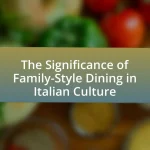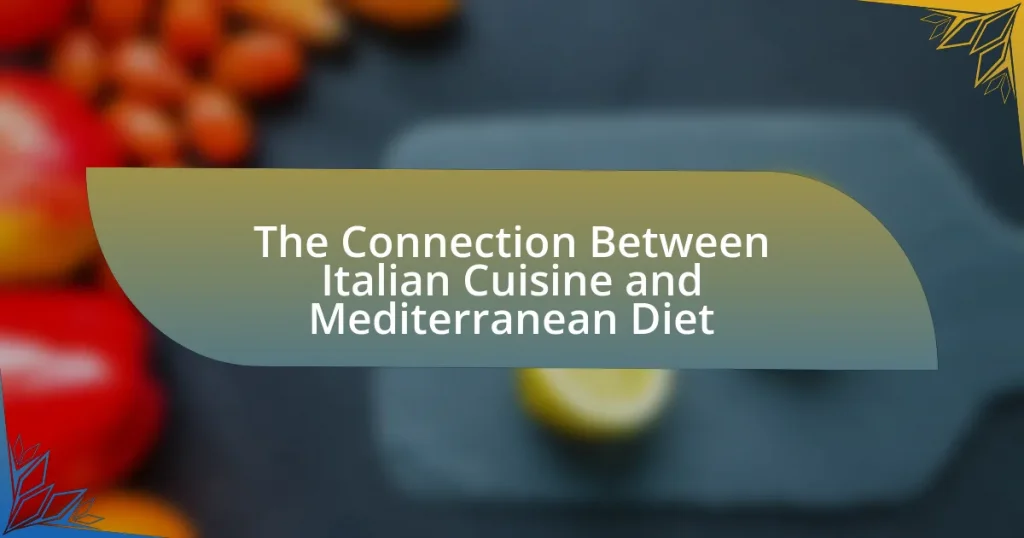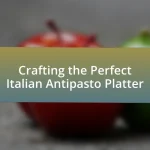The article explores the intrinsic connection between Italian cuisine and the Mediterranean diet, highlighting their shared emphasis on fresh, seasonal ingredients, healthy fats, and balanced meals. It details key components such as olive oil, vegetables, whole grains, and legumes that define both culinary traditions, while also discussing the health benefits associated with adherence to the Mediterranean diet, including reduced risks of chronic diseases. Additionally, the article examines historical influences, regional diversity in Italy, and practical ways to incorporate Italian dishes into a Mediterranean dietary framework, emphasizing the importance of local ingredients and cooking methods that align with healthful eating practices.
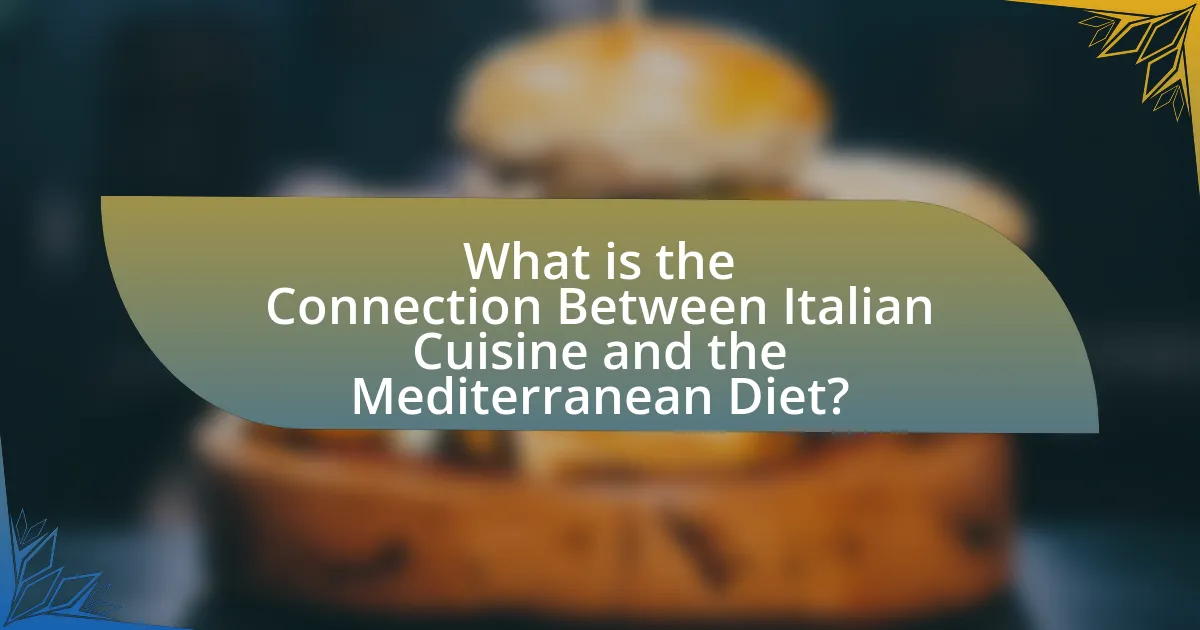
What is the Connection Between Italian Cuisine and the Mediterranean Diet?
Italian cuisine is intrinsically linked to the Mediterranean diet, as it emphasizes fresh, seasonal ingredients, healthy fats, and a balanced approach to meals. The Mediterranean diet, recognized for its health benefits, includes a high consumption of fruits, vegetables, whole grains, legumes, and olive oil, all of which are staples in Italian cooking. For instance, traditional Italian dishes often feature olive oil as the primary fat source, aligning with the Mediterranean diet’s focus on healthy fats. Additionally, studies, such as those published in the “New England Journal of Medicine,” have shown that adherence to the Mediterranean diet can reduce the risk of cardiovascular diseases, highlighting the healthful aspects of Italian cuisine.
How do Italian cuisine and the Mediterranean diet share common principles?
Italian cuisine and the Mediterranean diet share common principles through their emphasis on fresh, seasonal ingredients, and a focus on plant-based foods. Both prioritize the use of vegetables, fruits, whole grains, legumes, and healthy fats, particularly olive oil, which is a staple in both culinary traditions. Additionally, they advocate for moderate consumption of fish and poultry while limiting red meat and processed foods. Research indicates that these dietary patterns contribute to health benefits, such as reduced risk of chronic diseases, as highlighted in studies published by the World Health Organization, which recognize the Mediterranean diet as a model for healthy eating.
What are the key ingredients that define both Italian cuisine and the Mediterranean diet?
The key ingredients that define both Italian cuisine and the Mediterranean diet include olive oil, fresh vegetables, whole grains, legumes, fish, and herbs. Olive oil serves as a primary fat source, rich in monounsaturated fats, which are beneficial for heart health. Fresh vegetables such as tomatoes, peppers, and leafy greens provide essential vitamins and minerals, while whole grains like pasta and bread contribute fiber and energy. Legumes, including beans and lentils, offer plant-based protein and additional fiber. Fish, particularly fatty varieties like salmon and sardines, are emphasized for their omega-3 fatty acids. Herbs such as basil, oregano, and parsley enhance flavor without added salt, aligning with the Mediterranean diet’s focus on fresh, natural ingredients. These components collectively promote health benefits, including reduced risk of chronic diseases, as supported by studies highlighting the positive impacts of the Mediterranean diet on overall well-being.
How do cooking methods in Italian cuisine align with Mediterranean dietary practices?
Cooking methods in Italian cuisine align with Mediterranean dietary practices through the emphasis on fresh ingredients, healthy fats, and simple preparation techniques. Italian cuisine often utilizes methods such as grilling, roasting, and sautéing, which preserve the nutritional value of ingredients while minimizing the use of unhealthy fats. For example, the Mediterranean diet promotes the use of olive oil as a primary fat source, which is prevalent in Italian cooking, particularly in dressings and cooking. Additionally, traditional Italian dishes frequently incorporate vegetables, legumes, whole grains, and fish, aligning with the Mediterranean focus on plant-based foods and lean proteins. This alignment is supported by studies indicating that adherence to Mediterranean dietary practices is associated with reduced risk of chronic diseases, highlighting the health benefits of these cooking methods.
Why is Italian cuisine considered a vital part of the Mediterranean diet?
Italian cuisine is considered a vital part of the Mediterranean diet due to its emphasis on fresh, seasonal ingredients, healthy fats, and balanced meals. This cuisine incorporates a variety of vegetables, fruits, whole grains, legumes, and olive oil, which are foundational components of the Mediterranean diet. Research indicates that diets rich in these elements contribute to lower risks of chronic diseases, such as heart disease and diabetes, and promote overall health. The Mediterranean diet, as defined by the Mediterranean Diet Foundation, highlights the importance of these dietary patterns, which are exemplified in traditional Italian cooking practices.
What historical influences shaped the relationship between Italian cuisine and the Mediterranean diet?
The relationship between Italian cuisine and the Mediterranean diet has been shaped by various historical influences, including ancient trade routes, agricultural practices, and cultural exchanges. The establishment of trade routes during the Roman Empire facilitated the exchange of ingredients such as olives, grains, and spices, which became staples in Italian cooking. Additionally, the agricultural practices of the Mediterranean region, influenced by both Greek and Arab cultures, emphasized the use of fresh vegetables, legumes, and healthy fats, aligning closely with the principles of the Mediterranean diet. The Renaissance period further enriched Italian cuisine through the incorporation of new ingredients from the Americas, such as tomatoes and peppers, which are now integral to both Italian dishes and the broader Mediterranean diet. These historical factors collectively underscore the deep-rooted connection between Italian cuisine and the Mediterranean diet, reflecting a blend of local resources and cultural influences over centuries.
How does the regional diversity of Italy contribute to its role in the Mediterranean diet?
The regional diversity of Italy significantly enhances its role in the Mediterranean diet by providing a wide array of local ingredients and culinary traditions. Each region in Italy, from the coastal areas to the mountainous regions, offers unique produce, such as olives, tomatoes, seafood, and grains, which are fundamental components of the Mediterranean diet. For instance, the Mediterranean diet emphasizes the consumption of fruits, vegetables, whole grains, and healthy fats, all of which are abundant in various Italian regions. The use of fresh, seasonal ingredients is a hallmark of Italian cuisine, reflecting the agricultural practices and climate of each area. This diversity not only enriches the flavors and nutritional value of the diet but also promotes sustainable eating practices rooted in local traditions.

What are the Health Benefits of the Mediterranean Diet as Seen in Italian Cuisine?
The Mediterranean diet, as exemplified in Italian cuisine, offers numerous health benefits, including reduced risk of heart disease, improved metabolic health, and enhanced longevity. This diet emphasizes the consumption of whole foods such as fruits, vegetables, whole grains, legumes, nuts, and healthy fats, particularly olive oil, which is rich in monounsaturated fats that support cardiovascular health. Research published in the New England Journal of Medicine indicates that adherence to the Mediterranean diet can lower the incidence of major cardiovascular events by 30% compared to a control diet. Additionally, the diet’s high fiber content from plant-based foods aids in digestion and helps maintain a healthy weight, further contributing to overall health.
How does the Mediterranean diet promote overall health through Italian dishes?
The Mediterranean diet promotes overall health through Italian dishes by emphasizing the consumption of whole foods, healthy fats, and plant-based ingredients. Italian dishes often feature olive oil, which is rich in monounsaturated fats and antioxidants, contributing to heart health and reducing inflammation. Additionally, the diet includes a variety of vegetables, legumes, whole grains, and fish, which provide essential nutrients and support metabolic health. Research published in the journal “Nutrients” highlights that adherence to the Mediterranean diet is associated with a lower risk of chronic diseases, including cardiovascular disease and diabetes, due to its balanced nutrient profile and emphasis on natural ingredients.
What specific nutrients are abundant in traditional Italian meals?
Traditional Italian meals are abundant in carbohydrates, healthy fats, proteins, vitamins, and minerals. Carbohydrates primarily come from pasta, rice, and bread, which are staples in Italian cuisine. Healthy fats are largely derived from olive oil, a key ingredient known for its monounsaturated fats that support heart health. Proteins are found in various forms, including legumes, fish, and lean meats, contributing essential amino acids. Additionally, traditional Italian meals are rich in vitamins and minerals from fresh vegetables, herbs, and fruits, which provide antioxidants and essential nutrients. For instance, tomatoes, a common ingredient, are high in vitamin C and lycopene, while leafy greens offer iron and calcium. This nutrient diversity aligns with the principles of the Mediterranean diet, which emphasizes whole foods and balanced nutrition.
How do Italian recipes incorporate seasonal and local ingredients for health benefits?
Italian recipes incorporate seasonal and local ingredients to enhance health benefits by utilizing fresh produce that is at its peak nutritional value. This practice aligns with the Mediterranean diet, which emphasizes whole foods, including fruits, vegetables, whole grains, and healthy fats. For example, using tomatoes in summer when they are ripe increases their antioxidant content, particularly lycopene, which has been linked to reduced risk of chronic diseases. Additionally, local sourcing reduces the carbon footprint and ensures that ingredients are free from preservatives, further promoting health. Studies show that diets rich in seasonal and local foods contribute to better overall health outcomes, including lower rates of obesity and heart disease, supporting the efficacy of this approach in Italian cuisine.
What role does olive oil play in both Italian cuisine and the Mediterranean diet?
Olive oil is a fundamental ingredient in both Italian cuisine and the Mediterranean diet, serving as a primary source of healthy fats and flavor. In Italian cuisine, olive oil is used for cooking, dressing salads, and enhancing the taste of various dishes, reflecting its cultural significance and culinary versatility. The Mediterranean diet emphasizes the consumption of olive oil due to its health benefits, including reducing the risk of heart disease and promoting overall well-being, as supported by studies such as the PREDIMED trial, which highlighted the positive effects of a Mediterranean diet rich in olive oil on cardiovascular health.
Why is olive oil considered a healthy fat in Italian cooking?
Olive oil is considered a healthy fat in Italian cooking due to its high content of monounsaturated fats, particularly oleic acid, which is linked to various health benefits. Research indicates that these fats can help reduce bad cholesterol levels and lower the risk of heart disease. Additionally, olive oil is rich in antioxidants, such as vitamin E and polyphenols, which contribute to its anti-inflammatory properties and overall health benefits. The Mediterranean diet, which emphasizes the use of olive oil, has been associated with improved cardiovascular health and longevity, further validating its status as a healthy fat in Italian cuisine.
How does the use of olive oil in Italian cuisine enhance flavor and nutrition?
The use of olive oil in Italian cuisine enhances flavor and nutrition by providing a rich, fruity taste and essential nutrients. Olive oil contains monounsaturated fats, which are beneficial for heart health, and antioxidants like vitamin E and polyphenols that contribute to overall wellness. Studies have shown that incorporating olive oil into the diet can reduce the risk of chronic diseases, such as cardiovascular disease, due to its anti-inflammatory properties. Additionally, the flavor profile of olive oil complements various ingredients in Italian dishes, elevating the overall culinary experience while promoting a balanced Mediterranean diet rich in healthy fats.
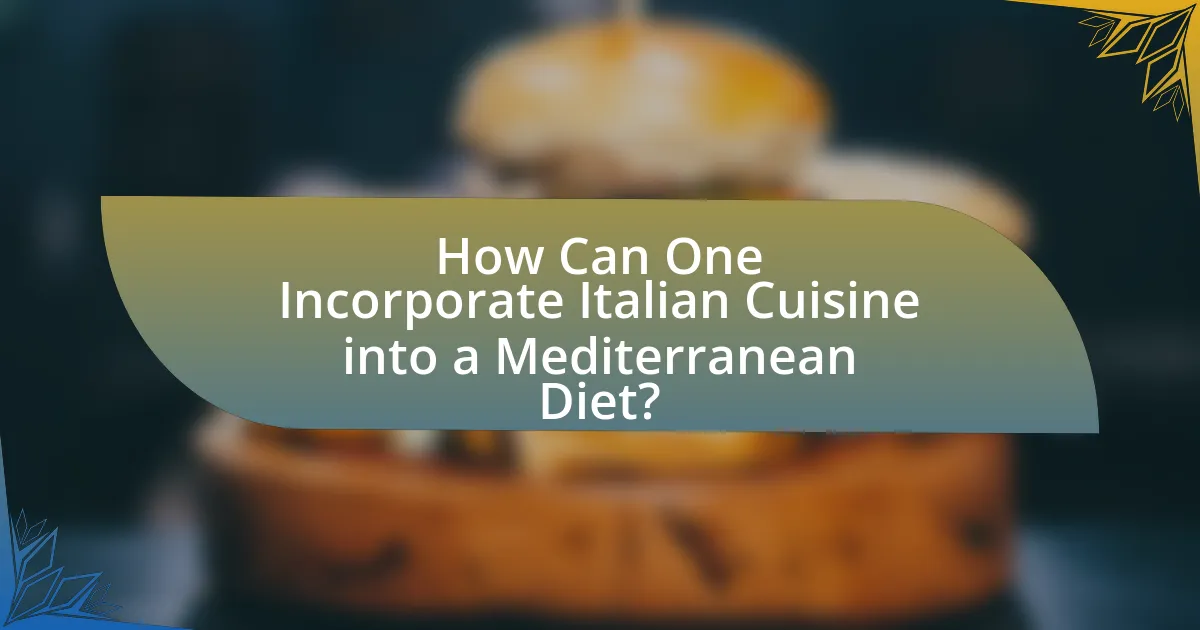
How Can One Incorporate Italian Cuisine into a Mediterranean Diet?
To incorporate Italian cuisine into a Mediterranean diet, one can focus on using fresh, seasonal ingredients typical of both culinary traditions, such as tomatoes, olive oil, garlic, and herbs. Italian dishes like Caprese salad, which features fresh mozzarella, tomatoes, and basil, align with the Mediterranean emphasis on plant-based foods and healthy fats. Additionally, whole grain pasta can be included, as it provides complex carbohydrates while maintaining the Mediterranean diet’s focus on whole foods. Research indicates that the Mediterranean diet, rich in fruits, vegetables, and healthy fats, is associated with numerous health benefits, including reduced risk of heart disease and improved longevity. Thus, integrating Italian cuisine through these principles supports both dietary frameworks effectively.
What are some easy Italian recipes that align with the Mediterranean diet?
Easy Italian recipes that align with the Mediterranean diet include Caprese salad, which consists of fresh mozzarella, tomatoes, basil, olive oil, and balsamic vinegar; and Pasta Primavera, made with seasonal vegetables and olive oil. These recipes emphasize whole, minimally processed ingredients, which are key components of the Mediterranean diet. The Mediterranean diet is recognized for its health benefits, including reduced risk of heart disease, due to its focus on fruits, vegetables, whole grains, and healthy fats, particularly olive oil.
How can traditional Italian dishes be modified for healthier options?
Traditional Italian dishes can be modified for healthier options by incorporating whole grains, reducing saturated fats, and increasing vegetable content. For instance, using whole grain pasta instead of refined pasta enhances fiber intake, which is beneficial for digestive health. Additionally, substituting olive oil for butter lowers saturated fat levels while maintaining flavor, as olive oil is a key component of the Mediterranean diet known for its heart-healthy properties. Increasing the proportion of vegetables in dishes like lasagna or pizza not only boosts nutrient density but also reduces calorie content. These modifications align with the Mediterranean diet’s emphasis on plant-based foods, which has been linked to lower risks of chronic diseases, as supported by research published in the “New England Journal of Medicine” that highlights the health benefits of Mediterranean dietary patterns.
What are the best practices for meal planning using Italian cuisine within a Mediterranean framework?
The best practices for meal planning using Italian cuisine within a Mediterranean framework include prioritizing fresh, seasonal ingredients, incorporating a variety of vegetables, and utilizing healthy fats such as olive oil. Italian cuisine emphasizes the use of whole grains, legumes, and lean proteins, which align with the Mediterranean diet’s focus on nutrient-dense foods. For example, meals can feature whole grain pasta, fresh tomatoes, and a variety of herbs, which not only enhance flavor but also provide essential nutrients. Research indicates that diets rich in fruits, vegetables, and healthy fats can reduce the risk of chronic diseases, supporting the Mediterranean diet’s health benefits.
What tips can help individuals adopt Italian cuisine while following the Mediterranean diet?
To adopt Italian cuisine while following the Mediterranean diet, individuals should focus on incorporating fresh vegetables, whole grains, lean proteins, and healthy fats. This approach aligns with the Mediterranean diet’s emphasis on plant-based foods and healthy fats, such as olive oil, which is a staple in Italian cooking. For example, using whole grain pasta instead of refined pasta increases fiber intake, while dishes like caprese salad, made with fresh tomatoes, mozzarella, and basil, provide essential nutrients. Additionally, incorporating fish, such as sardines or salmon, aligns with both Italian culinary traditions and the Mediterranean diet’s recommendation for regular fish consumption. Studies show that diets rich in these components can reduce the risk of chronic diseases, supporting the health benefits of this dietary approach.
How can one balance indulgence and health in Italian cooking?
One can balance indulgence and health in Italian cooking by incorporating fresh, whole ingredients and moderating portion sizes. Italian cuisine emphasizes the use of vegetables, legumes, whole grains, and healthy fats, which align with the principles of the Mediterranean diet known for its health benefits, including reduced risk of heart disease. For instance, using olive oil instead of butter and incorporating more vegetables into pasta dishes can enhance nutritional value while maintaining flavor. Studies show that the Mediterranean diet, which includes traditional Italian foods, is associated with lower rates of chronic diseases, supporting the idea that indulgence can coexist with health when mindful choices are made.
What resources are available for learning more about Italian cuisine and the Mediterranean diet?
Books, online courses, and culinary websites are valuable resources for learning about Italian cuisine and the Mediterranean diet. Notable books include “The Silver Spoon,” which is considered the bible of Italian cooking, and “Mediterranean Diet for Dummies,” which provides insights into the health benefits and recipes of the Mediterranean diet. Online platforms like Coursera and Udemy offer courses specifically focused on Italian cooking techniques and Mediterranean dietary principles. Additionally, websites such as the Mediterranean Diet Foundation provide research-backed information and recipes that emphasize the health aspects of this diet. These resources collectively offer a comprehensive understanding of both Italian cuisine and the Mediterranean diet.


